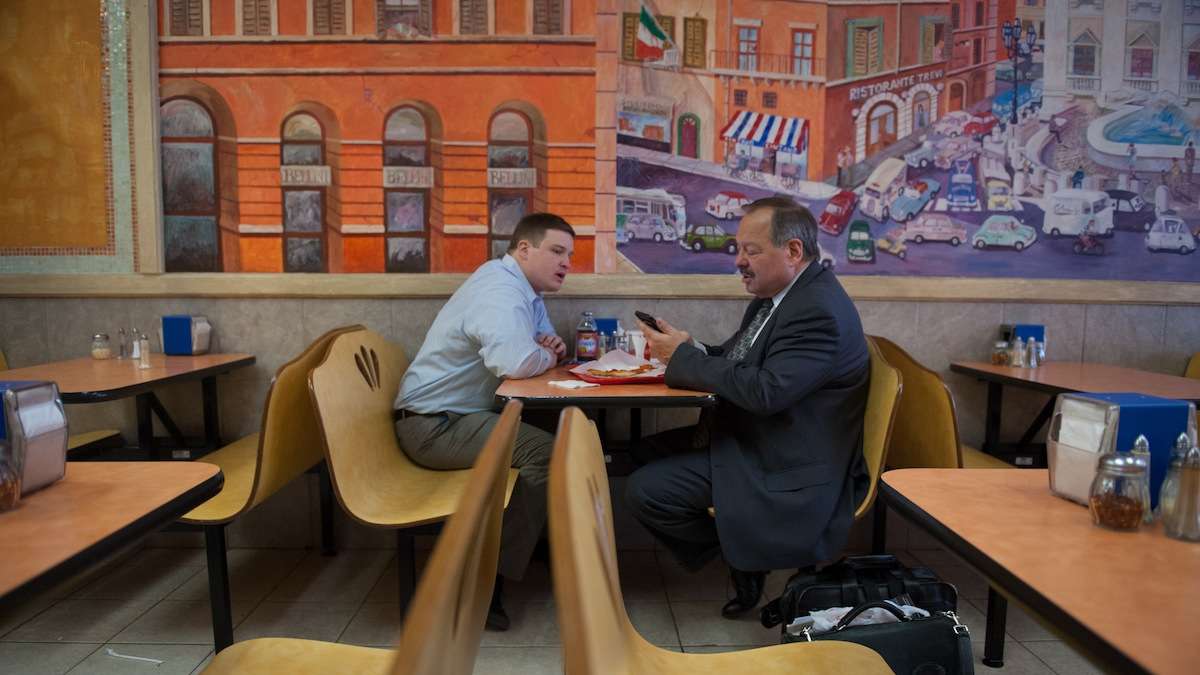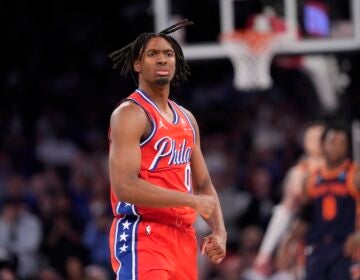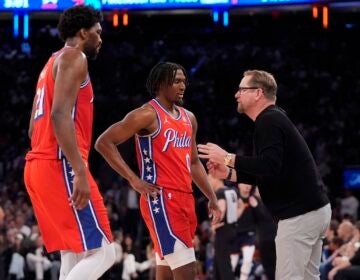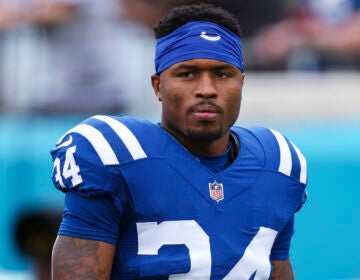Nelson Diaz on his plan for victory and getting heard in a crowded mayoral crowd [photo gallery]
NinetyNine caught up with mayoral candidate Nelson Diaz last week to chat about his read on the race thus far and where he thinks it’ll head as the May 19 primary approaches.
It just so happened that we scheduled tag-along time to continue our “photo galleries with the candidates” series for the same day as well (as you can see above).
What follows are excerpts from our 45-minute Q&A with the candidate from Chestnut Hill, with the main premise being the difficulties of being heard when some people think the race is divided into three candidates who have a shot to win it and three who don’t.
What he said
99: Are there certain things you’ve been saying throughtout the race that aren’t being heard?
Nelson Diaz: What hasn’t been said is that these individuals have been in the legislature and they essentially may vote the right way. … I have a proven track record of doing for the community for 45 years without having held elected office.
You can start with 1973 when I did economic development in the [city’s] Hispanic district. That was something I worked out with Frank Rizzo who was essentially an enemy of the minority community. I was able to work with him and we revitalized that urban district, and it’s still there. When I was a judge, I still did economic development. Here I am as a judge, I could have sat back ‘guilty, not guilty,’ but I got very active in making sure we did economic development in the city.
When I had the opportunity to fix the courts, nobody would have done it. I took the hit for reducing the staff by over 500 people, increasing productivity and fixing the courts, and I did it in 18 months. It was controversial, but it got done. Now, everybody thinks it’s a great thing when it’s done, but at the time, I had the [inflatable] rats going around City Hall, the Teamsters with the trucks, they put out literature calling me the ‘banana republic dictator.’ They called me all kinds of names. But, I just kept doing it.
I went to HUD and reformed public housing throughout the country. We got the benefit of it. We got the empowerment zone because I was there. I brought homeless money to non-profit groups here, elderly money for Title 5 programs. …
If you look at all of that, I’ve done nothing but bring resources to the city with no real financial benefit to me individually. I think that people don’t realize I don’t do this for any personal benefit. I do this because I think I can make the community better. … People that by me saying this, I’m just puffing. I’m not puffing. I’m just trying to say, ‘Hey look, I can do this as a citizen.’ All they know about the candidates is what they hear in the ads now and nobody can afford $5 million. If you’re writing a check like that, you’re not getting nothing.
These guys who are in the legislature say ‘well I voted for $240 million for the school system.’ I mean, you vote, but what do you do? It’s an important distinction.
The other thing that hasn’t been said is that Kenney was a part-time councilman. He was on the board of Independence Blue Cross making $36,000. He was the employer of Vitetta and the conflicts there were never conflicts despite many contracts with the city.
Diaz spokesman Barry Caro then pointed out a Vitetta reference in a recent Citified piece…
So what good does Kenney do Vitetta, if the firm indeed does no work for the City of Philadelphia, except those pre-existing projects? When asked that question, Pittman replied: “Jim in his career certainly has a very broad—what would I call it—database of contacts and so on. He hears about other projects and so on. His role was to advise us of projects that he was aware of, whether it was a Turnpike project or something in Harrisburg, then we would get in with the mix with the other companies and put or proposals together.”
Added Pittman: “But he’s not doing a lot of work for us right now.”
ND: Anybody else would have had to leave City Council to work that many jobs, and I don’t think anybody has said that at all. What kind of mayor would he be with those conflicts?
99: Are you saying you think he’s being treated with kid gloves?
ND: Yes.
99: Why?
ND: Because people are afraid of taking on Johnny Doc [Dougherty].
99: Is it a name-recognition issue for you?
ND: Lynne’s been around 20 years as a prosecutor. I don’t think they’re going to take her on yet until she really starts moving in the polls. Williams will bring Pam Africa out again. That was staged. He’ll remind people of the issues, he’ll remind people of Frederica Massiah-Jackson. But it’s not necessary at this point. [Williams] is trying to out-Wolf [Tom] Wolf, the Wolf strategy, which is be-on-TV be-on-TV be-on-TV. You suffocate the area.
And you can’t tell me there’s no coordination [between independent expenditure groups and Williams and Kenney]. Johnny was the one who got Kenney to run. You create a PAC. How can that not be coordinated?
99: How frustrating is it to see PACs lining up with other candidates?
ND: What bothers me is Citizens United. To allow, and to believe, that a corporation is a person that has a First Amendment right, and to allow them to spend as much money as they want. It’s related to the entire process. It’s not a good thing for this country to put that kind of money into politics. You can’t beat the Koch Brothers. If we were running a race like the one run by Nutter, we’d have more money than the other two. [Diaz had more cash on hand than Kenney in the most recent filings, per Caro.]
99: I see a lot of releases from your campaign about Kenney. Why is that?
ND: I don’t think the public understands that once he decided to run for mayor, he changed. I think people should know the difference. For my whole life, I haven’t changed. Who is this real person? Will he do anything? With Williams, my problem is the vouchers; they’ll kill the public-school system. Kenney voted for vouchers. Nobody said anything about that. He’s more like Abraham than anybody in the group, but Abraham is Abraham, she hasn’t done a switcheroo except for that one thing [marijuana decriminalization]. But, he’s totally become a different individual. Whatever it takes, he’s going to do it. He’s really a political operative than any of the other candidates running.
I’m trying to make sure all the facts are there for when people decide who to vote for.
99: Perhaps you see this because you’re not coming from an elected-official background?
ND: I think you have a point there. But I know these candidates really well.
Lynne is Lynne; she’s law and order all the way.
Williams has business interests, always had them, so he’s always going to look down that avenue. Look at his whole record.
The only one of the candidates who was one way one time and another way another time is Kenney. Consistency is something most of us have.
Doug’s a really nice man. I enjoy him. I feel he’s probably running for the future. He has no axe to grind. Who knows where he’s going to go. He’s very poised. Not a lot of experience. So, he’s doing well. Whether he has any ideas, we don’t know yet. But, everybody likes him. There’s no question he knows he’s not going to be mayor.
The biggest complain on Milton is he’s next to Williams on the alphabetical list.
99: What’s your path to victory?
ND: If people know that I have no interest in benefitting personally. I gave up all the benefits I had. If people realize all I’m doing this for is how I want to fix the schools, that’s all I care about. If I had someone in this group who I thought could fix the schools, I wouldn’t be in this thing. But my heart hurts when I see how bad it is.
I believe that most of the union leaders in the school system beleive that I could fix it. I have heard them say [politics prevent them from saying so publicly].
99: Are you going to be able to run television ads?
ND: Yeah. We’ll go up.
BC: We’ll be on TV. That’s all we’re saying right now.
ND: We’ll go up.
99: How do you tell your story when other candidates have more money and the forums don’t offer extended time for discussions?
ND: Forums have one-minute answers, and I talk too much. I don’t know how to speak in these 60-second spots. It was so hard for me to get issues in during the debates.
99: Well, how do you get around that?
ND: (sighs) I don’t have that answer. We’re going door-to-door, canvassing. We have large numbers of volunteers working with us. …
Getting that to the average voter is the hard part. I would just hope that, just based on the record, when people get into the voting booth, they realize that I’m the guy who will really represent their interests. I’m a guy that’s fair, and fairness is what people want to see. …
I don’t think they believed I would [reform the courts], but I did it. There are always people that believe that I can’t win.
99: Is that what drives you today?
ND: Yeah. That’s right. I truly believe that if I get a large Latino vote, and I get an African American vote that knows me, if I can get 20 percent of that, then get what I consider the liberal vote, I think that I can pull together 60,000 to 80,000 votes. If people go on my website, when they see us on TV, I think they’ll like us.
Previously:
Doug Oliver hits the subway in pursuit of votes [photo gallery]
A day after fainting, Lynne Abraham hits the campaign trail morning through night [photo gallery]
Tony Williams seeks votes outside the Reading Terminal Market [photo gallery and subsequent Q&A]
WHYY is your source for fact-based, in-depth journalism and information. As a nonprofit organization, we rely on financial support from readers like you. Please give today.




















